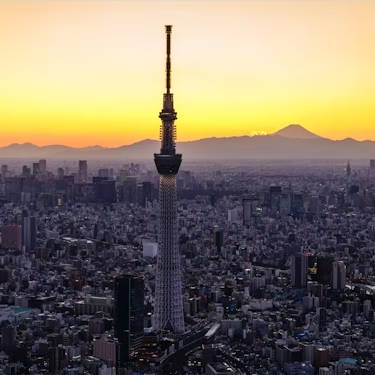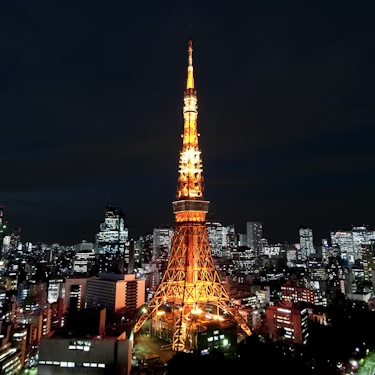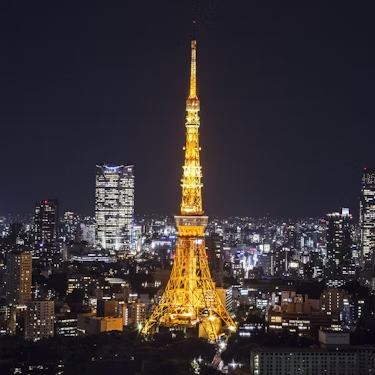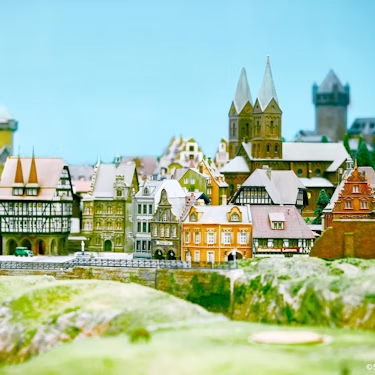More about: Best Things to Do in Tokyo
Tokyo is a vibrant city, with many attractions to see and activities to do. It has one of the largest metropolitan areas in the world and its multicultural side will easily engage you whatever your interests.
If you love food Tokyo will offer you the best dishes, if you are interested in history you will be fascinated by its ancient buildings and monuments, and if you are a nature lover you will also be amazed by its large parks. With the contrast between its state-of-the-art technological buildings and its historic temples, the Japanese capital will turn your trip into an adventure at every turn.
1. Visit Senso-ji Buddhist temple, the oldest temple in Japan
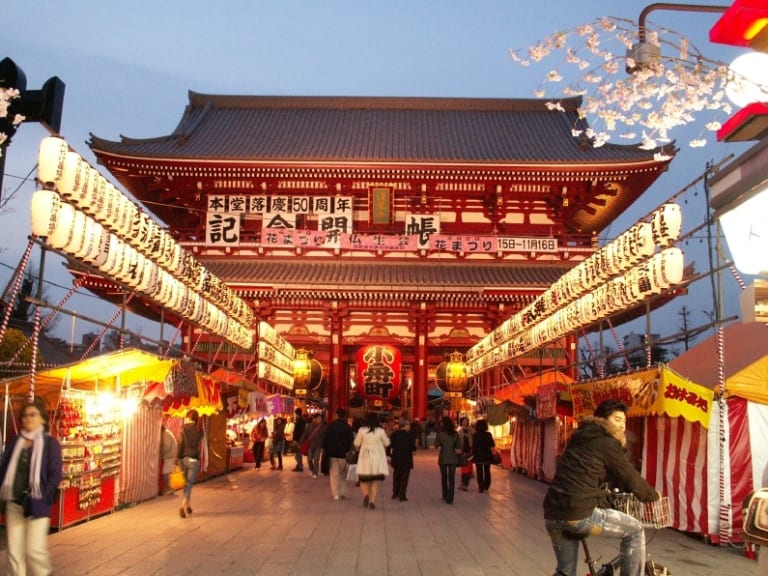
Buddhism is the majority religion in Japan and Senso-ji Temple is the oldest and most important temple in the country.
Located in the Asakusa district of northern Tokyo, it was founded in 645, but its fame increased substantially after World War II, as it was bombed and destroyed during the conflict, but its reconstruction was a symbol of peace and resurrection that united all Japanese.
Today it is one of the most visited buildings in the country and its importance is equivalent to that of major cathedrals in Catholic countries.
Senso-ji is a very beautiful temple and is well worth a thorough tour of its interior and its extensive complex, which includes the main building and its characteristic five-storey pagoda.
The first step is to enter through the Kaminarimon Gate and walk along the Nakamise-dori shopping street, which has 250 metres of shops on both sides, until you reach the Hozomon Gate, through which you can enter the pagoda, main halls and shrines. I recommend that you pay attention to the colours, details and ornamentations of the temple, as they are typical offerings of the Buddhist religion.
Senso-ji was a pilgrimage temple for the Japanese since its foundation and remains so to this day, so the shops on Nakamise-dori Street offer food, drinks and all kinds of products for pilgrims who come walking from all over the world.
Interesting details
- Price... Entrance to the temple is free of charge.
- Location... 2 Chome-3-1 Asakusa, Tokyo.
- Opening hours... The temple is open daily from 6am to 5pm.
- How to get there... From Tokyo Station take the JR Yamanote line train to Kanda and then the Ginza underground to Asakusa. However, the best way to get there and explore the area is with one of the city's guided tours.
2. Tour Ueno Park, the forest of museums.

Tokyo is a jungle of asphalt, hustle and bustle and traffic, but it also has natural spaces to relax in.
Ueno Park is the best known of the city's green lungs and one of the most interesting, because as well as lush vegetation, including some of Japan's most colourful flowers, it is home to some of the country's most traditional museums, such as the Tokyo National Museum, the Metropolitan Museum of Art and the National Science Museum.
If you're visiting Tokyo during the spring, you'll be able to see the famous hanami or cherry blossom blossom, which bathes every corner of Ueno Park in colour.
But the offer does not end there because this green lung is also a cultural reference where you can stroll among temples and shrines, play musical instruments, listen to concerts by street artists and go around Shinobazu Pond in small boats.
Ueno Park also allows you to enjoy Tokyo with children, because inside there is a zoo with many local species and one of the largest natural reserves of panda bears in the world outside China. I recommend a bike tour to make the most of this idyllic spot.
Interesting details
- Price... Entrance to the park is free.
- Location... Uenokoen, Tokyo.
- Opening hours... The park is open from 5.00 am to 11.00 pm.
- How to get there... From Tokyo Station take the JR Yamanote Line train to Okachimachi Station.
3. Visit the Imperial Palace, a fortress in the heart of Tokyo

The Imperial Palace is the official residence of the Emperor of Japan and occupies the grounds of the former Edo Castle.
Located in the urban centre of Tokyo, it is a massive fortress of retaining walls and control towers and one of Japan's most famous buildings. The Nijubashi bridges leading to the entrance of the inner grounds are the best known image of the Palace.
It is possible to visit the Emperor's residence, but except on special occasions it is only possible to enter the Oriental Gardens, which border the entrance gates, watchtowers, imperial walls and security moats.
Either way, touring these interior spaces of the Imperial Palace is a great experience to get a sense of the size of the residence.
It is a tradition in Japan for locals to come to the Palace gardens on New Year's Day and every December 23rd, when the imperial family takes to the balconies to greet visitors. If you're looking for things to do in Tokyo in December, joining in could be an interesting activity.
Take advantage of one of Tokyo' s photo tours to learn how to capture the most iconic images of the Japanese city.
Interesting details
- Price... Admission to the Oriental Palace Gardens is free.
- Location... 1-1 Chiyoda, Tokyo.
- Opening hours... The Palace is open Tuesday to Saturday from 9.00am to 2.45pm.
- How to get there... The Palace is located four blocks from Tokyo Station, where most train and underground lines converge.
4. Discover Akihabara, Tokyo's electronic and otaku culture district
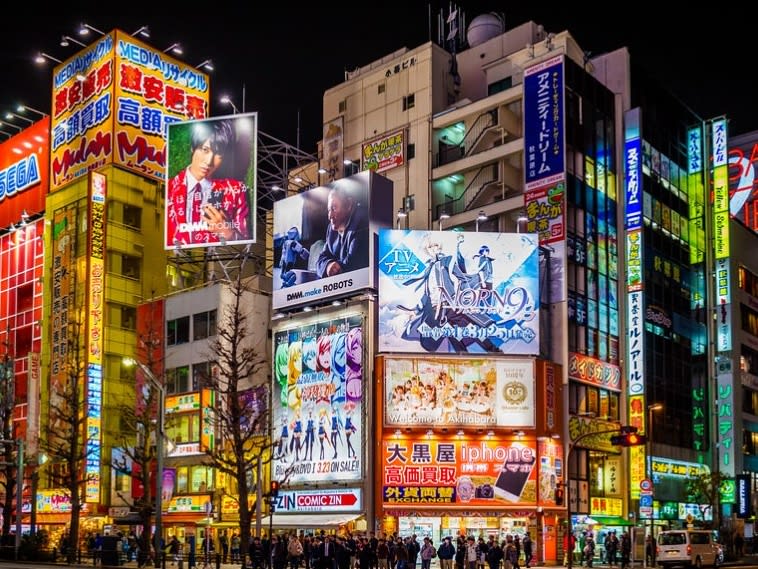
Akihabara is one of the most eclectic places in Tokyo, known for being the electronic quarter and the birthplace of manga, anime and video games. In this geek paradise you can dazzle yourself with neon billboards, sleep in capsule hotels, which are very popular in Japan, and have cosplay experiences.
If you're not a fan of anime and otaku culture, you can still enjoy the neighbourhood, which has become one of Tokyo' s most visited in recent years.
If you're a coffee lover, you're sure to find places that interest you in Akihabara, which is also known for its Maid cafés, where the waitresses dress up as maids. It's best to visit the area on Sundays, when the main street Chuo-Dori becomes pedestrianised.
There are many places in Tokyo where you can find electronic gadgets, but Akihabara is undoubtedly the area with the most variety and the best prices.
It is also possible to book guided tours in English and the area is often featured on many food tours of Tokyo, as it is one of the best places to eat in the Japanese capital.
- How to get there... Take the Hibiya underground line to Akihabara station and trains on the JR Yamanote and Sobu lines to Suehirocho station.
5. Take a trip to Mt. Fuji on the bullet train
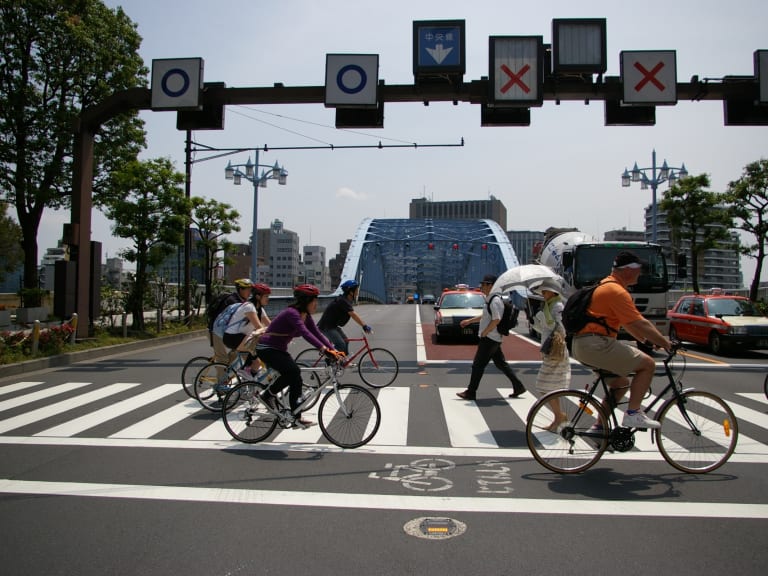
If you want a futuristic experience on your trip to Tokyo, I recommend a trip by bullet train to some of the cities near the Japanese capital, such as Kyoto, Yokohama and Osaka.
The shinkansen, as this train is known, which reaches 320 kilometres per hour, also takes you to Mount Fuji and Lake Ashi, a spectacle for the eyes as it combines technological evolution with the nature of the volcano. Without a doubt, a spectacle for the eyes as it combines technological evolution with the nature of the volcano.
If you are interested in this activity, be sure to read our article on Bullet Train Tours in Tokyo.
6. Get carried away in Kabukicho, Tokyo's red light district

Tokyo is an entertainment-oriented city and as such has a neighbourhood exclusively for adult entertainment. Kabukicho is the red-light district of the Japanese capital and home to hundreds of bars, restaurants and nightclubs. There are also a large number of cinemas and shopping venues.
Until a few years ago Kabukicho was a neighbourhood not recommended for visitors, but due to reports of robberies and other crimes, the Shinjuku government became involved in improving the safety of the site based on the positive experiences of similar neighbourhoods in cities such as Amsterdam.
Today, Kabukicho is a safe place for tourists and one of the most visited areas in Tokyo because everything is possible there, from shopping for video games to falling in love with a geisha.
In Kabukicho you can also discover attractions as diverse as the famous Godzilla head at the entrance of the Gramercy Hotel or the small Golden Gai bars where you can have a beer.
Nearby is the Hanazono Shrine, which dates back to the Edo period, and the Sengoku Buyuden restaurant, where you can put yourself in the shoes of a samurai.
- How to get there... Take the Marunouchi line metro to Shinjuku station and the JR Yamanote line train to Shin-Okubo station.
7. Eat fresh sushi at the Toyosu Market and learn how to cook it
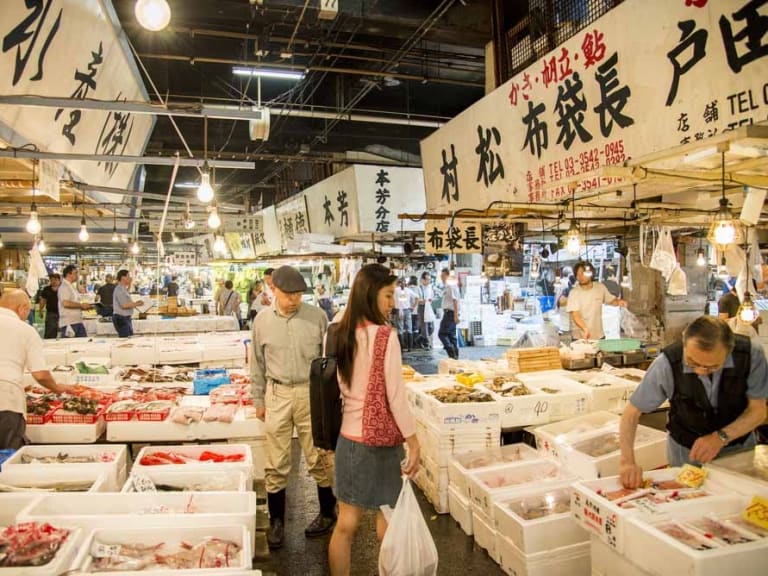
Toyosu is Tokyo's most famous fish market since it replaced the old Tsukiji. More modern and larger than its predecessor, it preserves tradition and is one of the most visited places by tourists, but also a place where you can mingle with the locals and enjoy the best fresh sushi in the Japanese capital.
You can also watch the famous early morning tuna auctions and browse the retail stalls where an estimated 10,000 tonnes of seafood are sold every month.
Fresh sushi stalls can be found at the entrance to the market, from where you can also witness one of the most beautiful sunsets in Japan.
If you visit Tokyo during the Christmas season, you'll see how it fills up with local visitors looking for the best fish for dinner.
Please note that if you want to watch the tuna auctions from one of the viewing platforms, you must visit the market before 6am and book your place on the market's official website.
If you just want to visit the market to see it and enjoy fresh sushi, the best time to visit is at noon.
Interesting details
- Price... Admission to the market is free.
- Location... 6 Chome-6-2 Toyosu, Tokyo.
- Opening hours... The market is open daily from 5.00 to 19.00.
- How to get there... By train on the JR Yamanote line to Shijo-mae station.
8. Go out for drinks in Roppongi, Tokyo's nightlife district

If you've done your sightseeing and are looking for a diversion, you can make the most of your visit to Tokyo by checking out some of the hundreds of venues located in Roppongi, the Japanese capital's nightclub and bar district.
The neighbourhood is also home to some of the city's most exclusive restaurants and a nightlife buzzing with tourists, students and artists.
Roppongi is also one of the most cosmopolitan spots in the city, with visitors from all over the world and the best views, as it boasts the privilege of being home to the tallest towers in the Japanese capital.
In recent years, the neighbourhood has also become home to some of the city's best events, such as the International Film Festival held every October in Tokyo and the cherry blossom celebrations in March.
The one thing that's certain in Roppongi is that wherever you go, you're sure to have a great time. In this neighbourhood you can enjoy international entertainment and contemporary art, the most interesting observatories and the best nightclubs. Here is our post on the best things to see and do in Tokyo at night.
- How to get there... By train on the JR Yamanote line to Roppongi Station or on the Ueno-Tokyo line to Roppongi-Yonchome Station. By underground on the Keikyu line combined with the Oedo line to Roppongi Station.
9. See the skies over Tokyo from the observation deck of the Radio Tower

If you've taken a trip to Mount Fuji from Tokyo, you'll be able to spot its silhouette on the skyline when you climb up to one of the viewpoints around the city. Especially if you're travelling to Tokyo in the summer or are lucky enough to have a clear day.
Among the many viewpoints you can visit, the most famous is at the top of the Radio Tower, which at 332 metres high is also the second tallest structure in Japan, behind only Tokyo Skytree.
The Radio Tower is a telecommunications and observation building inspired by the Eiffel Tower and strikingly painted in white and international orange to comply with aviation safety regulations.
Since its inauguration in 1958, the tower has been part of Tokyo's skyline, and from its two observation decks it is possible to see the entire city. It also has a glass floor that gives you the feeling that you are floating in the air.
At the base of the tower is also the picturesque Zojoji Temple, and its contribution is not only aesthetic, as it serves as a telecommunications antenna for broadcasting and digital television.
Other interesting viewpoints in Tokyo include the Mori Tower and the Metropolitan Government Building.
Interesting details
- Price... Entrance to the viewpoints costs approximately 10 euros.
- Location... 4 Chome-2-8 Shibakoen, Tokyo.
- Opening hours... The observation deck of the tower is open daily from 9.00 am to 10.00 pm.
- How to get there... By underground on the Oedo Line to Akabanebashi Station, Hibiya Line to Kamiyacho Station, Mita Line to Onarimon Station and Asakusa Line to Daimon Station. By train on the JR Yamanote line to Hamamatsucho station.
10. Walk the trails of Meiji Jingu Shrine

This shrine pays homage to the spirits of Emperor Meiji and his wife, Empress Shoken. Both were revered historical figures in Japan and when they died, this complex of monuments was built in Shibuya, surrounded by a forest with more than 300 species of trees from all the prefectures of the country.
There you will find various tributes, such as a cedar torii, which is the traditional Japanese arch of Shinto shrines, or the offerings of barrels of French wine, since Emperor Meiji was the first to allow this drink to be consumed in Japan.
The Meiji Jingu Shrine is also an oasis of peace in the noisy Japanese capital and a spiritual corner much visited by the Japanese, because it symbolises the unity of the country in the face of adversity, especially after the shrine was destroyed during the bombing raids of World War II and rebuilt with donations from taxpayers.
It is possible to visit on your own or with a guided tour, but be aware that it is a very large forest and the walk from the entrance to the foot of the shrine is strenuous. I recommend you bring comfortable shoes and water for hydration.
Keep in mind that if you visit Tokyo in winter the roads can be snowy and the temperature drops drastically, as it does in autumn.
Interesting details
- Price... Admission to the shrine is free.
- Location... 1-1 Yoyogikamizonocho, Tokyo.
- Opening hours... The shrine is open daily from 5am to 6pm.
- How to get there... By underground on the Odakyu Line to Sangubashi Station and by train on the JR Yamanote Line to Yoyogi Station.
10. Hike Mount Takao, Tokyo's natural treasure

From the heights of Tokyo you can see Mount Fuji, which is the highest peak in Japan, but you don't have to go that far for an amazing mountaineering experience.
Much closer to central Tokyo you can find Mount Takao, which is about 600 metres high and has eight hiking trails that allow you to discover another side of the city.
Mount Takao also has a scenic cable car, chairlifts and it is possible to reach the surrounding area by train. In addition to some of Tokyo' s best scenery and an open view of Mount Fuji, it is home to a botanical park, a Buddhist temple and a funicular railway. It is one of the most attractive natural sights in the Japanese capital.
If you're interested in a hiking experience, at Mount Takao you can either hike on your own on one of the eight available trails of varying difficulty levels or take a guided hike to the top with the assistance of a local guide.
Either way, it's a great way to escape Tokyo's neon lights and bustling city centre for a few hours, and to take some of the best photographs of the Japanese capital.
Interesting details
- Price... Entrance to the Mount Nature Reserve is free.
- Location... Periphery of Hachioji, Tokyo.
- How to get there... By underground on the Chuo Line to Kobotoke Station, about five kilometres from Mount Takao. To get to the entrance of the nature reserve you need to hire private transport.
When is the best time to travel to Tokyo?
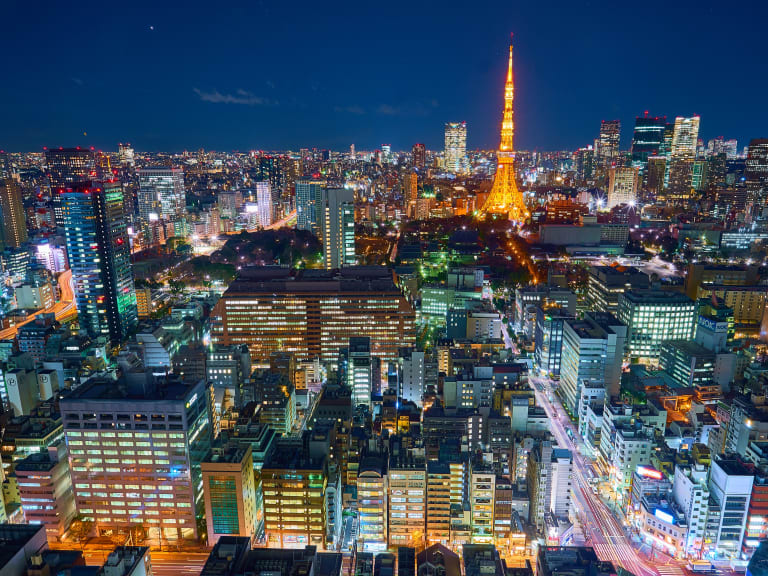
It is difficult to answer the question of when is the best time to travel to Tokyo because whenever you go you will find an endless number of activities to discover this fascinating city of contrasts.
However, to help you in your decision, I leave you a list of articles where I list the best things to do in the months when the Japanese capital receives the most visitors:
- 10 things to see and do in Tokyo in January
- 10 things to see and do in Tokyo in February
- 10 things to see and do in Tokyo in May
- 10 things to see and do in Tokyo in October
- 10 things to see and do in Tokyo in November
- 10 things to see and do in Tokyo in December
Finally, you may also find it useful to organise your trip to Tokyo according to the number of days you plan to spend in the city. To give you a hand, here are some itineraries:









